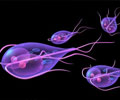A new study warns that triclosan, a synthetic antibacterial used in personal care products, is leading to the rise of resistant bacteria in streams and rivers.
A new study published in the journal Environmental Science and Technology warns that triclosan, a synthetic antibacterial used in personal care products, is leading to the rise of resistant bacteria in streams and rivers.
Invented for surgeons in the 1960s, triclosan slows or stops the growth of bacteria, fungi, and mildew. Currently, around half of liquid soaps contain the chemical, as well as toothpastes, deodorants, cosmetics, liquid cleansers, and detergents. Triclosan enters streams and rivers through domestic wastewater, leaky sewer infrastructure, and sewer overflows, with residues now common throughout the United States.
Emma Rosi-Marshall, one of the paper's authors and an aquatic ecologist at the Cary Institute of Ecosystem Studies in Millbrook, New York explains: "The bacterial resistance caused by triclosan has real environmental consequences. Not only does it disrupt aquatic life by changing native bacterial communities, but it's linked to the rise of resistant bacteria that could diminish the usefulness of important antibiotics."
Source-Eurekalert











